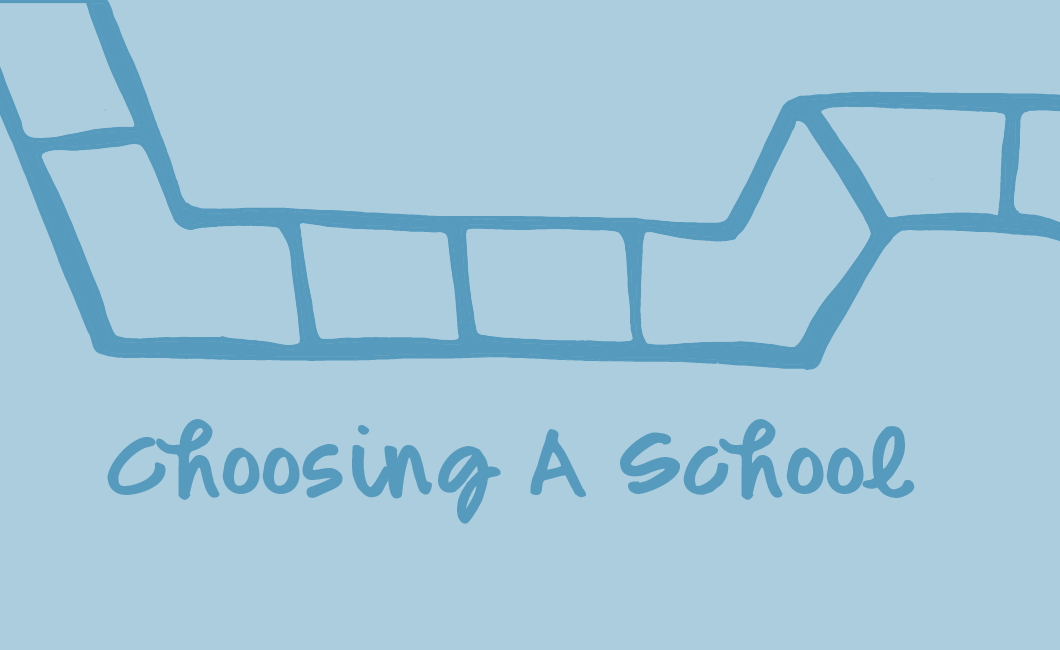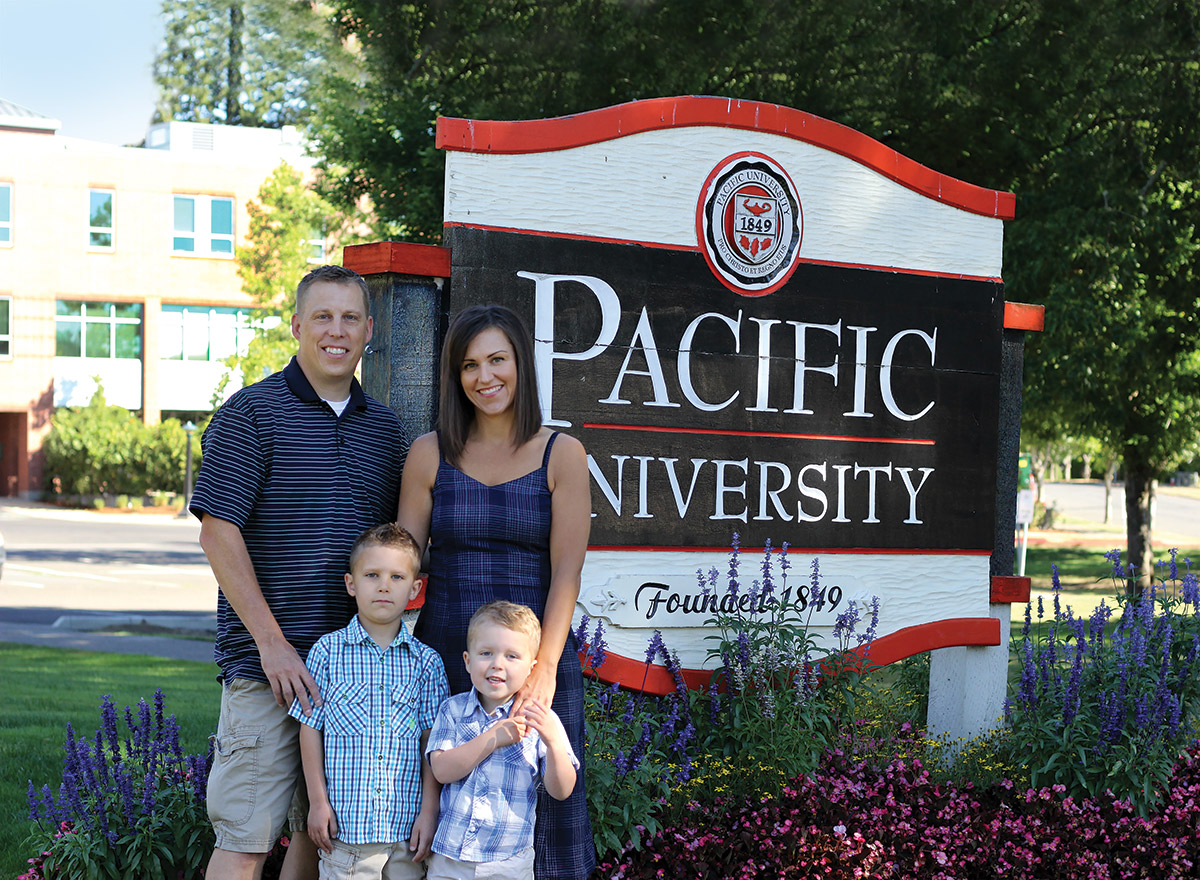Do Your Homework

Pacific University alumna Erica DeBois MAT ’97 is wrestling with a big decision.
DeBois must soon decide where to send her oldest child to elementary school and, like many parents of young children, she’s finding that it’s not exactly an easy choice, even for someone with her credentials.
DeBois has been a high school teacher in Hillsboro, Ore., for the past two decades. Her husband, Andrew, is also an experienced educator.
Their oldest child, Easton, has attended Pacific’s Early Learning Community (ELC) since kindergarten and thrived there. Now, the DeBoises are trying to decide where to send him when he graduates from the ELC in second grade, and they’re feeling a bit conflicted.
It’s not hard to understand why. As parents, they want the best for their children, including a strong educational start. Both value public education, but know that class sizes within public schools can fluctuate (sometimes dramatically) from year to year, depending on funding levels.
“Two years ago, I had 40 kids in each of my classes,” said Erica DeBois, who teaches Advanced Placement (AP) U.S. history and a class on volunteering.
“We’re not opposed to going the public-school route, but class size is an important consideration for us,” especially during the foundational, early-learning years, said DeBois.
Erica and Andrew are approaching their search for the right school in a manner that’s familiar to them — by doing their homework. They’re evaluating all their options, including parochial school and a popular local charter school, and then digging deeper.
“We are trying to be as informed as possible,” said DeBois, who has researched potential schools online and talked to friends, neighbors, fellow educators and even some of her own students about various schools.
As a parent and an educator, DeBois teaches children to advocate for themselves and to be attuned to their feelings. That’s one reason that she plans to involve her son in the school-selection process.
“We will probably apply to get into the Forest Grove Community School and see if we hit the lottery,” said DeBois, referring to a charter school that selects students through a lottery.
“If we get a spot, we’ll go there and visit with Easton and have him be a part of the decision-making process to see if it’s a good fit,” she said.
Leif Gustavson, dean of Pacific’s College of Education, says visiting the schools on your list is an essential step in the school-search process. Many schools offer tours and open houses for prospective students and their parents, but Gustavson suggests taking things a step further.
“Go to your neighborhood school, meet the principal, ask to sit in on classes and have your child visit and spend time there,” Gustavson said.
“If you ask to observe a class and the school says ‘we don’t do that,’ that’s a data point in your decision-making process,” he added.
"If we can raise good human beings, they will be successful no matter where they go."
– Erica DeBois MAT '97
When evaluating a school, many parents focus on what’s being taught there. But that’s only part of the picture. It’s equally (if not more) important to get a sense as to how and why individual schools do what they do in terms of teaching methodologies and curriculum content, according to Gustavson.
“Don’t focus all your interest on what students are learning. Perhaps even more important than that is how they are learning,” he said.
During a school visit, ask teachers and administrators such questions as: How would my child learn here? Describe what classrooms and classes are like? What’s happening now that’s exciting?
“The how and why are crucial to learning,” Gustavson explained. “Our brains are wired not to pay attention to boring things. From an evolutionary standpoint, our survival hinges on paying attention to interesting things. Children learn best when they’re excited and engaged.
“Ultimately, the most important issue to consider is whether children are learning in personally interesting, meaningful and enduring ways.”
Parents, he added, should strive not just to gather information about a particular school, but to listen closely to the stories that teachers and administrators tell about their students and experiences at the school.
“You want to create opportunities to hear from administrators and teachers about what’s going on in the school,” Gustavson said.
“Pay attention to how they’re talking about the children: What kinds of stories are they sharing and what are the children doing in these stories? What do the teachers and administrators appreciate about the kids, or what are they learning from them?”
At a time when parents have a growing number of school options, finding the right fit can be stressful. But it’s also important to keep in mind that “right” isn’t synonymous with perfection, Gustavson said. Schools — like the human beings that teach and study within their walls — are complex.

His own children have attended schools that were both “good for different reasons” and “challenging for different reasons.” They’ve had great years, and years that weren’t especially meaningful. And that’s okay, he said.
“Schools are like life. Sometimes we’re up. Sometimes we’re down. Sometimes we’re coasting,” Gustavson said. “The goal is to fashion a life, and the schooling within it, to be made up of as many rich, challenging and joyful experiences as possible.”
Indeed, sometimes a great education, like life itself, is a little messy, said Pacific alumnus Anthony “Tony” Cox ’74, a retired teacher and administrator with more than 40 years of professional experience.
“Schools are doing, and have done, quite a bit of work to come up with a common vision and common set of goals and methodologies. But teachers can take the same curriculum and deliver it in a totally different way,” Cox said.
That too is okay.
“Kids respond to such a variety of methods and personalities,” said Cox, who, as an administrator, was usually able to bridge differences between students and teachers.
The role of a school, he said, is not just to deliver an excellent education from an academic standpoint, but to help students develop life skills.
“The beauty of school is that a kid will encounter every kind of adult personality in their teachers that they will encounter for the rest of their lives,” Cox said. “They need to learn to work with all kinds of people, sometimes not necessarily those they like.”
As they search for the right school for their son Easton, the DeBois family is also keeping in mind the bigger picture.“If we can raise good human beings, they will be successful no matter where they go,” said Erica DeBois. ■
College Search 101
Choosing a college is a difficult decision for many students. There are many factors to consider, from cost to location to reputation.
For Pacific alumnus and experienced educator Tony Cox '74, the personal connections he found at Pacific were what made the difference.
But there are other factors to consider when selecting a school. Cox, along with Pacific's College of Education Dean Leif Gustavson, offer a number of tips for families undertaking the college search:
- Explore different types of colleges and universities
- Don't rule out a school becuase of its "sticker price"
- Apply, then compare financial aid packages
- Tour prospective schools, sit in on classes, meet with admissions officers and ask lots of questions
- Parents: Be involved, but empower your student to take the lead
This story first appeared in the Winter 2017 issue of Pacific Magazine. For more stories, visit pacificu.edu/magazine.


